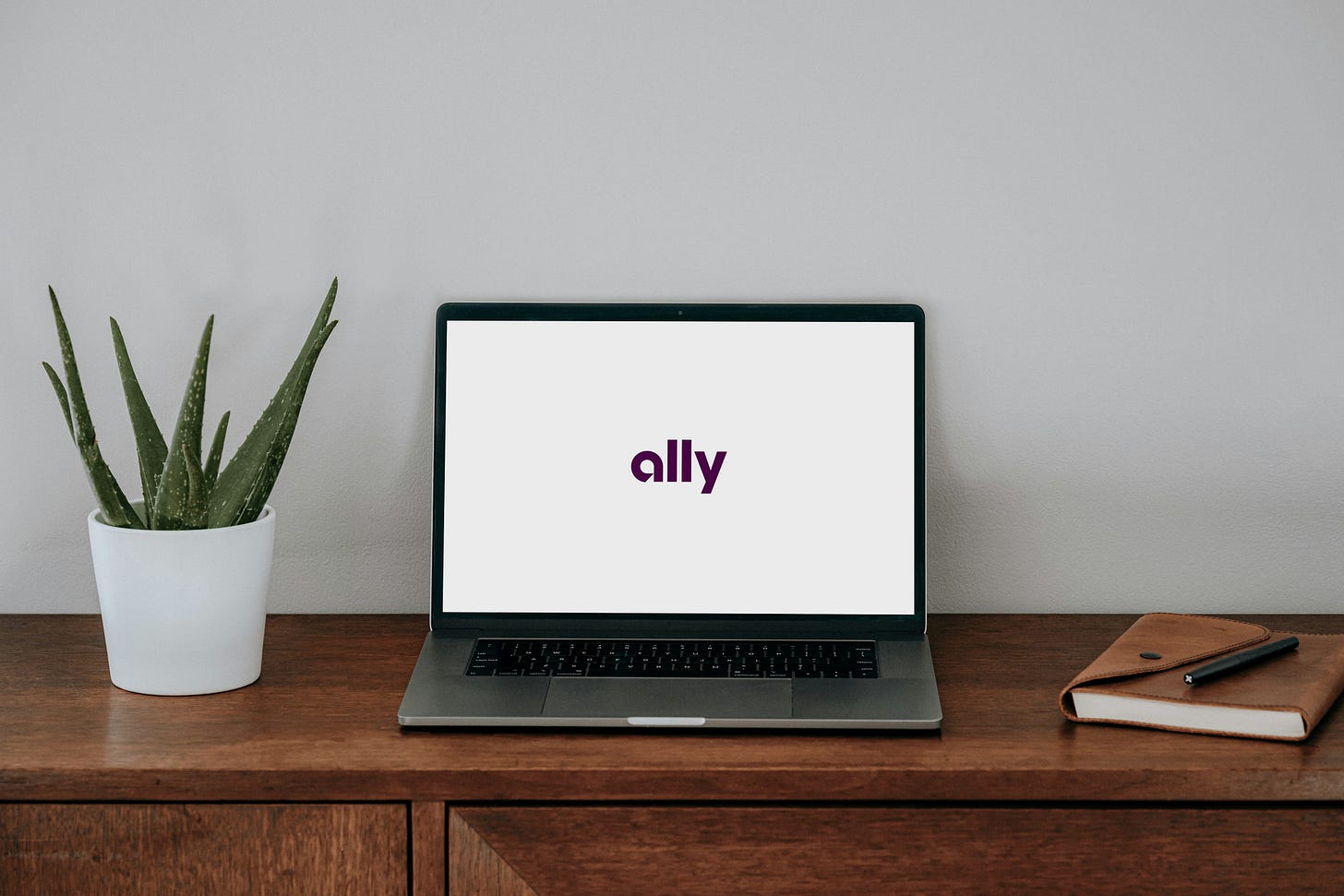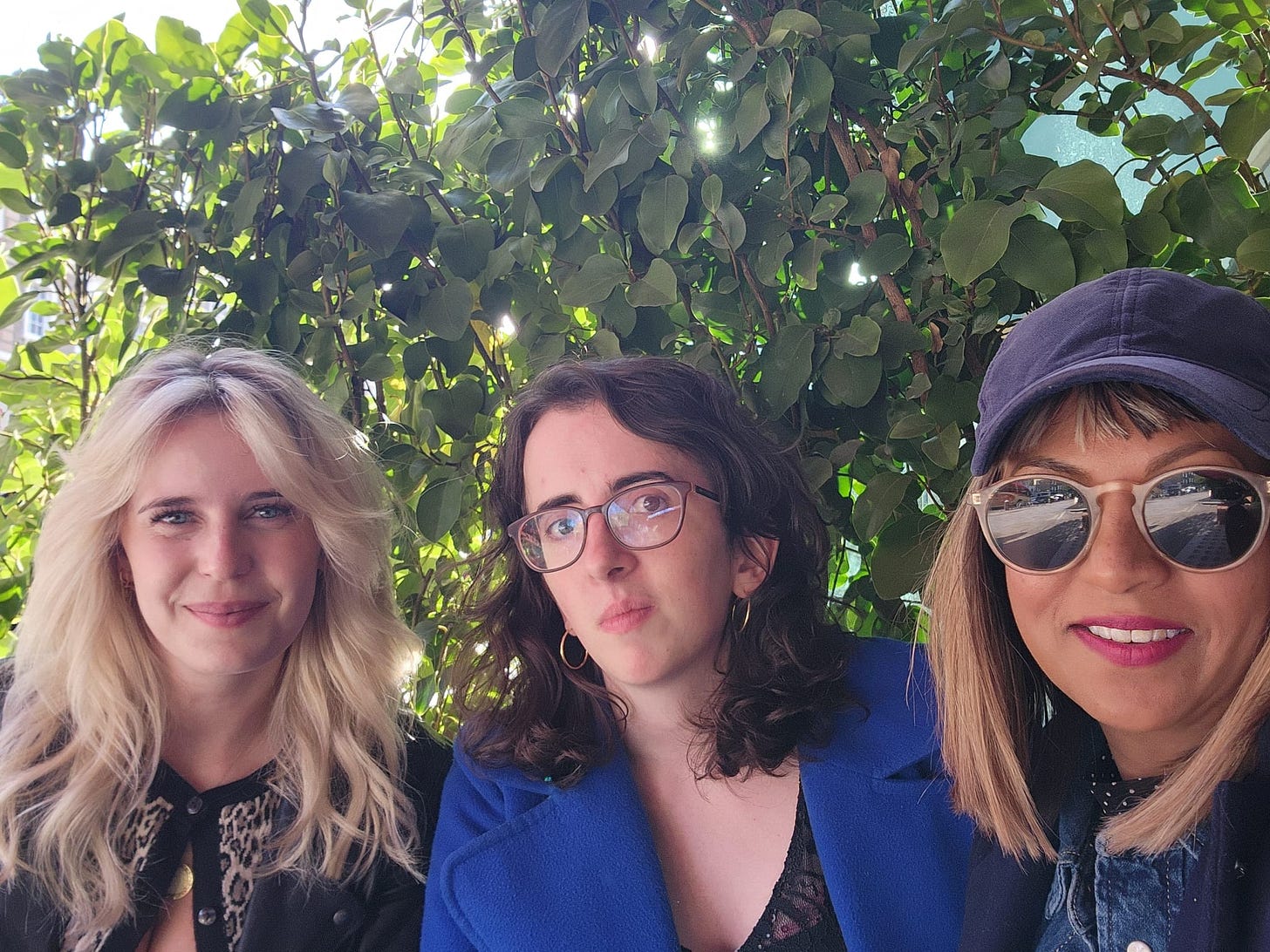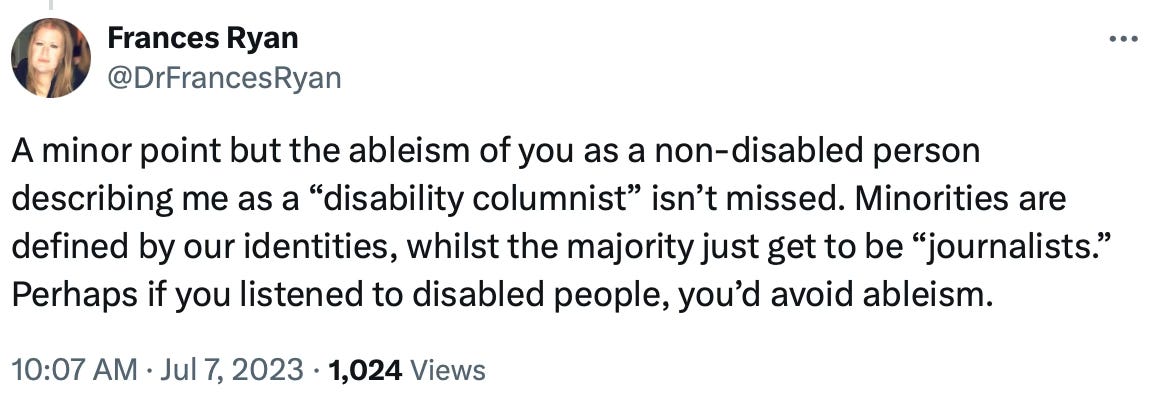Allyship Is About Language
What More Can I Say?
Written in a post meltdown haze while at work, this needed to be shared as a cohesive tangent of my day-to-day lived experience. If you want to be an anti-ableist, this is something I have been trying to articulate for a while when asked how to be that.
“How can I be an ally to disabled people?”
It’s always an innocuous question asked with the best of intentions. Allyship has been a much-used word over the past few years, in being and becoming something aspirational, obtainable.
I will never forget the white influencer I saw in Manhattan, for example; she stopped traffic to hold up a ‘Black Lives Matter’ banner, all to be captured for her Instagram page. A cause so worth the while had become social media fodder instantly in one tiny gesture that spoke volumes in the silence. The shape of a silence is what should interest us, culturally, sometimes.
The better phrasing should be “How can a non disabled person be an ally to a disabled person?” This is not a term you can give to yourself; that’s clearly indicating that this is being *exactly* not that. We can’t award ourselves the social points; that’s not the name of the game, so to speak.
To me, an ally is someone who admits they can get it wrong sometimes - and are willing to learn from someone, such as if there is a ‘feedback session’. (That’s been asked of me a lot lately by the medical establishment prone to a culture of indifference. Nothing is learned meanwhile.) An ally will ask questions politely and aren’t entitled about that - see also: what’s wrong with you? - but also go looking for resources to learn in their own free time. (“What’s wrong with you?” was demanded of me by strangers on the London Underground on too many occasions to count. We wouldn’t ask, say, “How were your smear tests?” or “Are you pregnant?” unless, say, you are a medical professional. But I digress.)
They are the person who shows up in good grace for DEI training if they work full time - and are not the person to mock it as ‘great, another e learning to complete.’ (A reference to a Reddit thread of medical professionals discussing a public inquest to do with ME, when a twenty six year old woman had in fact died. When they were *still* debating if ME was/is even real. Someone had died a horrible death - it was not the time to be ‘debating’ the aftermath or legitimacy of such a condition, in such an unbelievable manner. ) There may have been red, angry tears at reading such a thing; that woman deserved so much better, and we miserably failed her.
If there’s one whiff of something unjust like an access barrier, the allies are the people by your side. I think of the friend who told off an individual who made me cry in an instant - as they’d had a go at me for being disabled, and using a cane to walk with. Presumptions had been made about my earning capacity, as if I was not rich enough to be in the environment - people like me were not supposed to be in the venue ostensibly. We promptly left the building, to eat elsewhere - because why would we spend our hard earned cash at such a place? The same goes for establishments that place you at the back of their shop on the basis you scare customers, forget all about you, and serve your food cold but still want a tip. (Also an experience of mine last year - not a day remembered too fondly.) They let you cry it out, nursing your spirit into its resilience. They are the people who bring you up, and accept you wholly as you come. They see the best in you as a given standard every damn single day.
You are allowed to be a multi-faceted person in their presence; you are not the be all and end all of your disability, reduced to an eternal justification of having to explain yourself at every given turn for basic standards of care and other facets to be met. It’s not for social or professional kudos, that a disability can be co-opted to prove ‘I’m an ally’. A want to ‘help’ means to take cues from us, and not assuming what help we need. Pushing a wheelchair is actually likely to cause harm if it is unwarranted help, for example. Otherwise, this is just tokenism - the opposite of inclusion.
Spaces that are built for this are the ideal place to be, and it is such a privilege; Content Is Queen hosted the International Women’s Podcast Festival, and I felt so at ease for the duration of the event. At no point did anyone ask me anything to do with my disability, other than if I needed help going up the stairs or with directions around the building and area. And that felt so refreshing. I got to talk about anything but this tiny part of my life! I got to be girly as a default option which rarely happens in such a context. Women were dressing for other women! It was bloody joyous, and pink, and brilliantly tender.
(This is the Beyond Awareness panel group I hosted - a recorded event all about disability - and this was such a lovely, thoughtful discussion.)
In her role as First Lady, Jacqueline Kennedy reportedly noted how any changes - both good and bad - were brought about through the use of words. Everything starts with words. You may as well make them a ‘good set’ at least. The same goes for the disability space; if you want to be an ally, or be a part of a feminism that is at the very least disability inclusive, you need to be aware of your language at a minimum. That is the true role of what it means to be an ally - not to be the language police, but to at least be aware of direct and indirect impact of anything that is verbally articulated or disseminated when written down.
There are nine separate issues that run throughout my body, all of which interact and crossover. I view myself as a disabled person; I am a critic of Neurodiversity, but that’s for another newsletter. (The 19th Newsroom put up an excellent expose which is a lot of why I am not a fan of the concept - for myself and only myself however. I would never police this on other people) I do not describe myself as Neurodivergent, simply because that is not the whole picture of me as a disabled person with access needs, and organisations would use this against me. I also detest the idea of ‘superpower’ - I am a neutral human in that I am allowed to live with nuance. I still need help sometimes, and I have outside interests, too. I am not heroic or brave for merely living day after day. War correspondents are brave by comparison.
You may be surprised that I use to perform as a stand up poet prior to the pandemic, or that I had previously been a member of the air cadets. (One poetry ‘sketch’ was to cover the satirical work ‘No Means Yes’ by Salena Godden. Always a crowdpleaser as a feminist work, that one.) I’m also in the acknowledgements of the reissued Letters Of Sylvia Plath (volume 1); ‘Daddy’ is something I can recite from memory. But that’s what I mean by outside interests - we are allowed to be separate from our work or callings, and not be an extension by proxy. It’s also a healthy measure to manage, too.
My specialism as a journalist is disability and social inequality issues - not just the SEN space. Out of almost 100 editorials I’ve out together this year as an editor, maybe two have been SEN specific in total. I am uneasy when approached with commissioned work in this space - because sometimes, there are commissions that land in my inbox that just scream ‘token Autistic’. This is pigeonholing to tick an inclusion box sometimes. This is indirect language - it also has an impact. I have yet to be commissioned on an ad hoc basis, say, to speak about reproductive health or Long Covid.
When it comes to language, the microaggressions have felt a bit too much lately. I am tired of explaining and justifying. I am not an ‘Autistic journalist’ - the same way you wouldn’t describe your arm and leg as being autistic. Nor am I a ‘journalist with autism.’ If I explain it once - and how the language is offensive (Google as to why) - that should be respected. (The alleged eugenics background makes my skin crawl - this is a great media guide meanwhile, as I know a lot of journalists read this newsletter.) It’s something that has happened across a wealth of projects for the last few months; I am tired of having to explain repeatedly why this should be standard as an ethical basis. That boundary on a lot of collaborations has often been stamped on lately, especially whenever I have been approached with the caveat of ‘please can you educate me’.
Dr Frances Ryan articulated this perfectly last year. (Link to the thread here - Substack has yet to allow for tweet embeds.)
Allyship is best translated by the use of language is what I have learned so far this year.
It does not cost anyone to use the language someone likes; if a woman changes her surname when she marries, that is not all that different. The same should be afforded to disabled individuals - just follow the language they use for themselves, and keep in mind that we are multifaceted human beings. We have other interests, age appropriate interests - and to actively understand that is the ultimate act of allyship.




